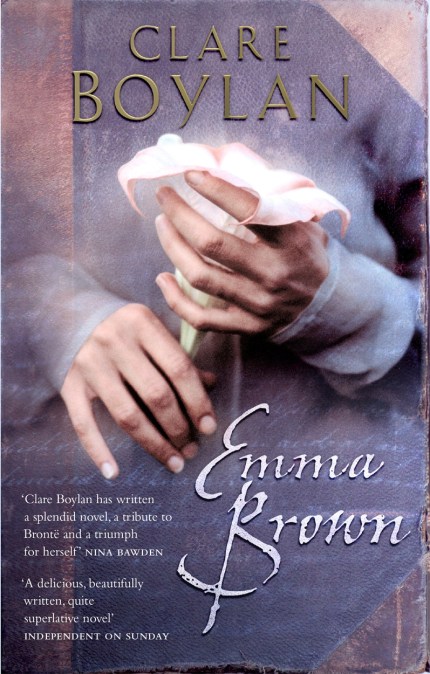When Charlotte Bronte died in 1855, she left behind the beginnings of a new novel – twenty pages of a work in progress called Emma. Now, almost 150 years later, Clare Boylan has returned to this most intriguing of fragments, and turned them into an astonishing story of mystery, atmosphere and page-turning suspense.
When Conway Fitzgibbon arrives at Fuchsia Lodge with his daughter Matilda, the headmistress Miss Wilcox couldn’t be more delighted. The ladies’ school is limited in numbers and eager for new pupils, particularly ones so finely dressed, and boasting a father who is ‘quite the gentleman’. But as Christmas approaches, and Miss Wilcox inquires about arrangements for the holidays, she is in for a shock. Conway Fitzgibbon, like the address he left behind, does not exist. So who is Matilda? With Miss Wilcox unable to extract any information out of the girl, it falls to a local lawyer, Mr Ellin, and a young widow, Isabel Chalfont, to unravel the truth. What they discover is a tale that travels the highs and lows of nineteenth-century England, an investigation that begins as curiosity and ends up changing all their lives forever . . .
When Conway Fitzgibbon arrives at Fuchsia Lodge with his daughter Matilda, the headmistress Miss Wilcox couldn’t be more delighted. The ladies’ school is limited in numbers and eager for new pupils, particularly ones so finely dressed, and boasting a father who is ‘quite the gentleman’. But as Christmas approaches, and Miss Wilcox inquires about arrangements for the holidays, she is in for a shock. Conway Fitzgibbon, like the address he left behind, does not exist. So who is Matilda? With Miss Wilcox unable to extract any information out of the girl, it falls to a local lawyer, Mr Ellin, and a young widow, Isabel Chalfont, to unravel the truth. What they discover is a tale that travels the highs and lows of nineteenth-century England, an investigation that begins as curiosity and ends up changing all their lives forever . . .
Newsletter Signup
By clicking ‘Sign Up,’ I acknowledge that I have read and agree to Hachette Book Group’s Privacy Policy and Terms of Use
Reviews
There is much of Dickens, and perhaps even more of Wilkie Collins, in the plotting, which survives a tendency to the schematic or mechanical to deliver a story that ranges widely through 19th-century England and society. This is a remarkable achievement i
hugely daring...this is living in the mind of another writer...delicious, beautifully written, quite superlative.
Clare Boylan's expansion of Bronte's scrap of plot into Emma Brown is powerfully imagined and stylish, with enough melodramatic twists to keep the momentum going until the end. She is distinctly successful in recreating faithfully an idiom both familiar yet obsolete. Charlotte Bronte left a fragment of a novel at her death, subsequently published under the title Emma, concerning the placement by a rich father of a haughty and unresponsive daughter at a school for young ladies. As with Jane Austen's Sanditon or Dicken s' Edwin Drood it has offered later writers the challenge of guessing a dead author's intentions.

